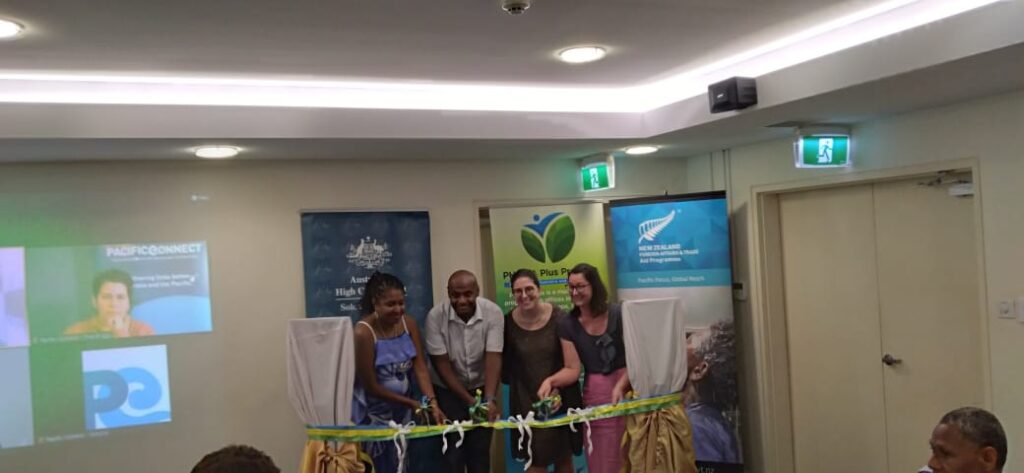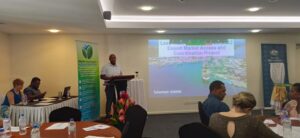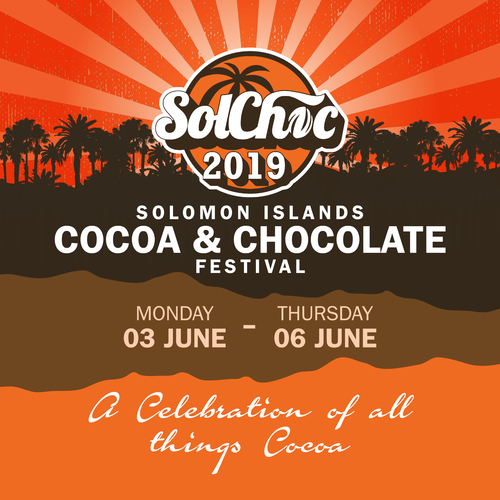Innovative new pilot project to assist cocoa farmers to access export markets

(From left) PHAMA Plus National Facilitator Judith Reynolds, Ueniusu’unu Agribusiness Group Managing Director and Team Leader James Kana, Australian High Commission First Secretary – Economic Growth Louisa Macdonald Hall and New Zealand High Commission’s Hannah Van Voorthuysen during the launch of the Less Than a Container Load (LCL) Access to Markets project in Honiara on Friday, July 16, 2021.
An innovative new pilot project has been launched in the Solomon Islands that aims to help local farmers to export their cocoa.
The Less Than a Container Load (LCL) Access to Markets project aims to revolutionise the export market by allowing local cocoa growers and consolidators to share the costs of freight and logistics. It will achieve this through the use of a digital platform where exporters can share information as well as the space and costs of shipping containers for export. This new platform is being developed and tested during this pilot.
The pilot project is being run by local agribusiness entrepreneur James Kana of Ueniusu’unu Agribusiness Group. The initiative is being funded by the Governments of Australia and New Zealand through the Pacific Horticultural and Agricultural Market Access Plus Program (PHAMA Plus) under its Export Business Recovery Initiative (EBRI) Grant. PHAMA Plus piloted the EBRI in the Solomon Islands as a response to the significant strains brought about by COVID-19 on Pacific Island supply chains and for low-income producers and workers within them. The International Centre for Development Partnerships is also funding the development of the digital platform. Other partners in the project include Solomon Ports, Express Freight Management (EFM), Earth Water People and Common Code.

“COVID 19 has exposed various vulnerabilities both in the core business and in the wider agribusiness group and its business partners. A key impact has been the drastic increase in an already very high freight and logistics cost. Small and medium exporters currently can’t afford to access export markets, as only Full Container Load (FCL) system is operational,” Mr Kana said.
“There is no option to access a Less-than-Container-Load (LCL) freight consolidation system or other freight-sharing facility. For logistics sector, freight forwarders and agents, COVID 19 has exacerbated the usually low and unpredictable demand for break-bulk (alternative to LCL) freight options or palletising of consignments, which are labour intensive and time-consuming. This represents a significant constraint to smaller and medium-sized exporters, making certain export and business opportunities unviable.”
COVID-19 has also had a negative impact on the utilisation of shipping containers at the main port. Currently, for every five containers which arrive with imports, only one container is exported. This means that four containers are ‘empties’ and sitting idle in the port area or they are loaded back on the ship with no value being gained from the unutilised container space. This ratio will get worse as major exports have been hit-hardest. Overall, it represents a missed opportunity, is a waste of money and comes at a high environmental cost.
In response to this, UAG is leading a consortium of partners to pilot a first-of-its-kind integrated LCL system to offer an affordable freight service for high value commodities, initially in the cocoa sector, but which then can be replicated for other commodities such as coconut, coffee and ngali nut.
About LCL
The LCL initiative offers a long-term viable option for small medium exporters of high value commodities to access export markets. The LCL aims to provide businesses from the Solomon Islands with a freight service that can accept smaller consignments on a cost-effective basis, not requiring a full container load and not imposing costs for container space not used.
Through sharing the cost of using an integrated LCL system and storage facility, smallholder growers and consolidators will be able to have access to otherwise inaccessible export markets. The collaborative nature of the integrated LCL system makes it possible for each stakeholder to buy-in and be able to see the value of what they are investing in. It makes the freight cost of exports proportionate to the volumes being traded and available from smallholder growers and consolidators.
The necessary multi-stakeholder partnership that is required to operationalize this system has already been assembled. The initiative will combine innovative technology with the partnership members to make the freight consolidation process more transparent, efficient, equitable and profitable.
*For more information contact Samantha Kies-Ryan on 7233 822 or PHAMA Plus Senior National Facilitator Solomon Islands on p.ramohia@phamaplus.com.au

